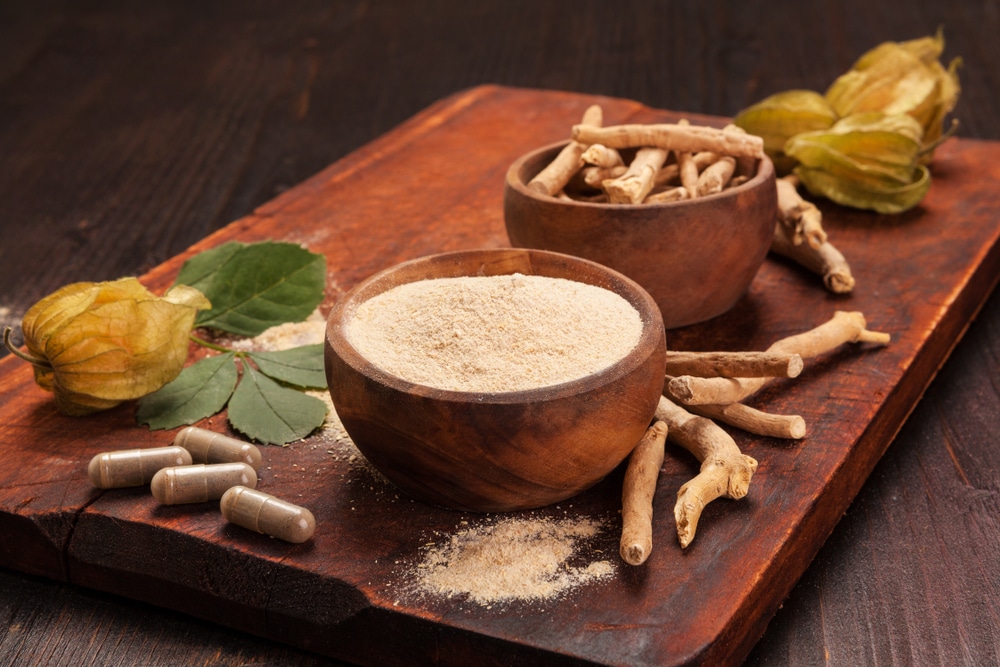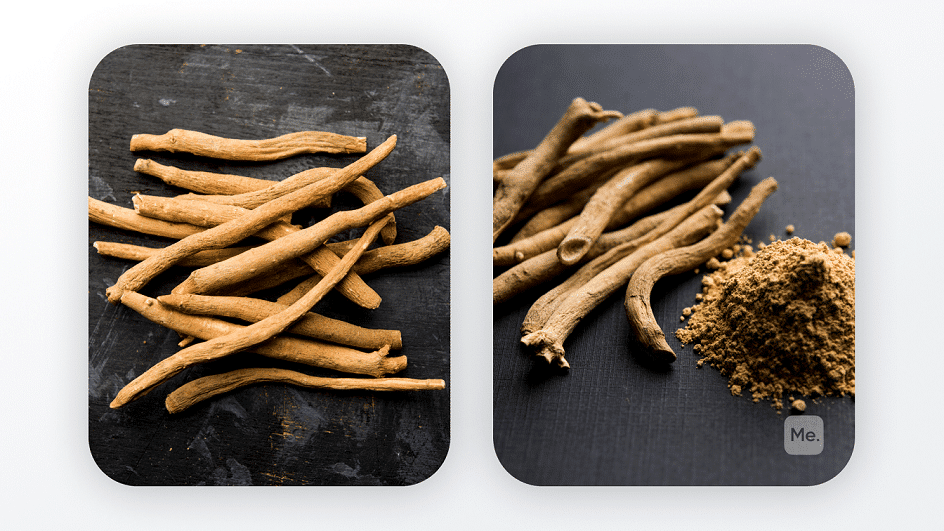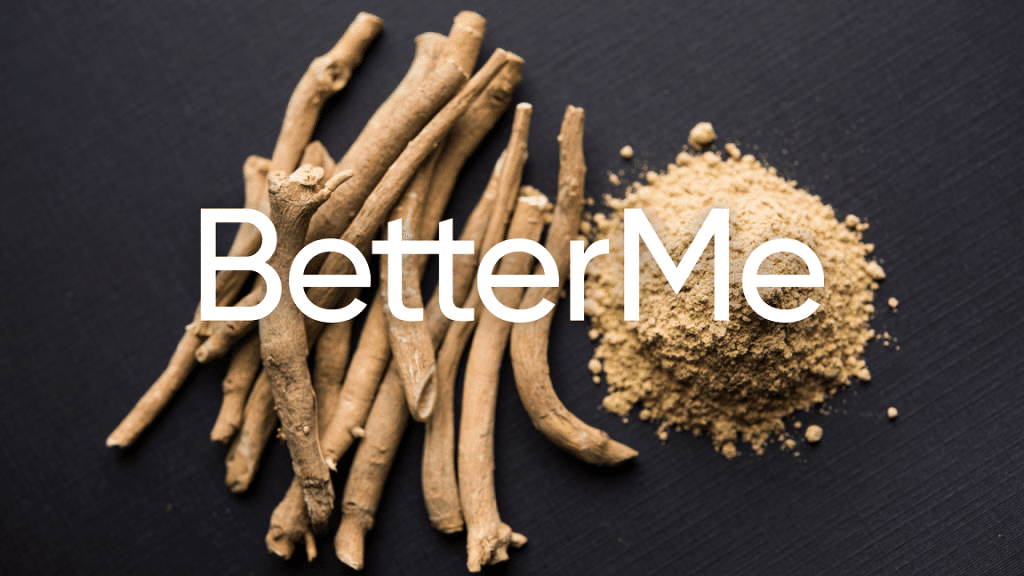Stress is a major cause of suboptimal thyroid function. This happens when the body produces too much of the stress hormone cortisol. Cortisol suppresses the thyroid gland, which in turn can lead to low levels of thyroid hormones (hypothyroidism) (8). Often, people with hypothyroidism are prescribed synthetic thyroid hormone replacement therapy (21). While this can be an effective treatment, some people may prefer to try natural treatments first, especially if their hypothyroidism is mild, or subclinical. Ashwagandha is an herb that has been used in Ayurvedic medicine for centuries. It’s thought to help with a variety of conditions, including stress and anxiety (16). Some people believe that it may also help treat hypothyroidism by reducing cortisol levels (7). In this article, we’ll take a look at the evidence behind ashwagandha and hypothyroidism. We will also discuss dosage, side effects, and potential risks. Always talk to your doctor before starting any herbal supplements.
What Is Ashwagandha?
Ashwagandha (Withania somnifera) is an herb that has been used in Ayurvedic medicine for centuries. It is sometimes referred to as “Indian ginseng” because of its similar appearance to ginseng (Panax ginseng) (1).
Ashwagandha is thought to be an adaptogen, which means it may help the body cope with stress. The active compounds in ashwagandha include withanolides and withaferins (1). These compounds are thought to have anti-inflammatory, antioxidant, and immune-boosting properties.
Some people take ashwagandha for its purported health benefits, which include (1):
- Reducing stress and anxiety
- Improving brain function
- Boosting energy levels
- Lowering inflammation
Ashwagandha is available in many forms, including capsules, powders, extracts, and some even made into tea.
How Does Ashwagandha Work?
It’s thought that ashwagandha works by reducing levels of the stress hormone cortisol. Cortisol is produced by the adrenal glands in response to stress (17).
While cortisol is necessary for the body to function properly, too much of it over long periods of time can be harmful. Chronically high levels of cortisol have been linked to a variety of health problems, including (5) (15):
- Weight gain
- Anxiety
- Depression
- Sleep problems
- Immune system suppression
- Infertility
- High blood pressure
Ashwagandha is thought to decrease cortisol levels by affecting the way the body responds to stress. In one study, people with a history of chronic stress who took ashwagandha twice daily had lower levels of cortisol than those who took a placebo (2).
Read More: Ashwagandha Benefits For Weight Loss: Here’s How This Ancient Herb Can Help You Lose Weight
How Might Ashwagandha Help Treat Hypothyroidism?
Hypothyroidism occurs when the thyroid gland doesn’t produce enough thyroid hormones. This can happen for a variety of reasons, including iodine deficiency, autoimmune disease, certain medications, and radiation therapy (12).
Symptoms of hypothyroidism include fatigue, weight gain, dry skin, and constipation. Hypothyroidism is typically treated with synthetic thyroid hormone replacement therapy (12).
While this treatment is usually effective, some people initially may prefer to try natural treatment. Ashwagandha is one such treatment that’s been studied for its potential to treat hypothyroidism.
Insufficient research exists to confirm that ashwagandha is effective for treating hypothyroidism. However, a few studies indicate promising results.
In one study, 50 people with hypothyroidism were given either ashwagandha or a placebo for eight weeks. Those who took ashwagandha had significantly lower levels of the stress hormone cortisol. They also had improvements in thyroid hormone levels and other markers of hypothyroidism (7).
This herb has certain properties that may make it beneficial for treating subclinical hypothyroidism. These include the potential ability to:
Reduce Stress And Anxiety
The compounds in ashwagandha are thought to have anti-stress and anxiety-reducing effects (2). This may be beneficial for people with hypothyroidism, as stress can worsen symptoms.
Lower Inflammation
Ashwagandha is also thought to have anti-inflammatory effects (18). This may be helpful for people with autoimmune thyroiditis, as inflammation is a key component of this condition.
Support Thyroid Function
The compounds in ashwagandha are thought to promote the production of thyroid hormones (3). This may help improve symptoms of hypothyroidism.
Antioxidant Effects
Ashwagandha is also a potent antioxidant (1). This may protect the thyroid gland from oxidative stress which could help improve its function.
Immunity Support
Ashwagandha is also thought to have immune-boosting properties (13).
If you tend to let yourself off the hook, raise the white flag when things get tougher than you expected, send yourself on an unconscious binge-eating trip – BetterMe app is here to help you leave all of these sabotaging habits in the past!
Can Ashwagandha Help Thyroid Weight Loss?
People with hypothyroidism often struggle to lose weight, even when following a healthy diet and exercising regularly. This can be frustrating and discouraging.
While there’s no cure for hypothyroidism, treatment can help improve thyroid hormone levels and alleviate symptoms. This may make it easier to lose weight.
There is no evidence that ashwagandha can directly help with weight loss. However, the herb may indirectly promote weight loss by reducing stress and anxiety, lowering inflammation, and improving thyroid function.
These effects may lead to a reduction in weight gain or facilitate weight loss.
Ashwagandha Dosage For Hypothyroidism
There is no standard dose of ashwagandha for hypothyroidism. However, a common dosage is 300 mg per day. It’s best to start with a lower dose and increase it gradually as needed. Talk to your doctor about what dose might be safe for you.
You can take ashwagandha in many forms, including capsules, powders, and extracts. It can also be made into tea.
If you’re taking ashwagandha for the first time, start with a low dose and increase gradually as needed. This will help your body get used to the herb and reduce the risk of side effects.
Are There Any Risks?
Ashwagandha is generally considered safe for most people (10). However, it can cause some side effects, such as stomach upset, diarrhea, and vomiting.
It’s also important to note that ashwagandha can interact with certain medications, including (11) (22):
- Thyroid hormone replacement therapy
- Blood thinners
- Diabetes medication
- Immune-suppressing drugs
If you’re taking any medications or have any underlying medical conditions, speak to your doctor before taking ashwagandha.
Read More: Your Guide To Post Workout Recovery Shakes And Supplements
How Else Can You Manage Hypothyroidism?
There are many other things you can do to help manage your hypothyroidism.
Here are a few tips:
Iodine-Rich Foods
Eating iodine-rich foods can help improve your thyroid function, because it needs iodine to make thyroid hormones (14). Some good sources of iodine include seaweed, eggs, and dairy products.
Avoid Goitrogens
Goitrogens are compounds that can interfere with thyroid function (20). They’re found in certain foods, such as cruciferous vegetables like Brussels sprouts, cabbage, and kale, as well as soy products. If you have hypothyroidism, it may be best to limit these foods. Talk to your doctor or dietitian for individualized recommendations.
Manage Stress
Chronic stress can worsen symptoms of hypothyroidism (4). Try to find ways to manage your stress, such as yoga, meditation, and deep breathing exercises.
BetterMe app will kick you out of the mental funk, shake off your extra weight, rid you off your energy-zapping habits, and help you sculpt the body of your dreams. Intrigued? Hurry up and change your life for the better!
Exercise Regularly
Regular exercise can help improve your thyroid function (9). It can also help reduce stress and anxiety (6). The recommended amount of exercise for people with hypothyroidism is 30 minutes per day, five days per week.
Get Enough Sleep
Getting enough sleep is important for overall health. It can also help reduce stress levels and improve thyroid function (19). It’s recommended that adults get 7 to 9 hours of quality sleep per night.
Take Your Medication
If you have hypothyroidism, it’s important to take your medication as prescribed. This will help manage your symptoms and keep your thyroid hormone levels in the normal range.
The Bottom Line
Overall, there is insufficient research to determine whether ashwagandha is effective for treating hypothyroidism. However, this herb may be beneficial due to its ability to reduce stress, lower inflammation, and support thyroid function.
A few studies show promising results but more research is needed to confirm the potential benefits of ashwagandha for treating this condition.
If you’re considering taking ashwagandha for hypothyroidism, talk to your doctor first. They can help you weigh the potential risks and benefits of this herb and determine whether it’s right for you.
DISCLAIMER:
This article is intended for general informational purposes only and does not serve to address individual circumstances. It is not a substitute for professional advice or help and should not be relied on for making any kind of decision-making. Any action taken as a direct or indirect result of the information in this article is entirely at your own risk and is your sole responsibility.
BetterMe, its content staff, and its medical advisors accept no responsibility for inaccuracies, errors, misstatements, inconsistencies, or omissions and specifically disclaim any liability, loss or risk, personal, professional or otherwise, which may be incurred as a consequence, directly or indirectly, of the use and/or application of any content.
You should always seek the advice of your physician or other qualified health provider with any questions you may have regarding a medical condition or your specific situation. Never disregard professional medical advice or delay seeking it because of BetterMe content. If you suspect or think you may have a medical emergency, call your doctor.
SOURCES:
- An Overview on Ashwagandha: A Rasayana (Rejuvenator) of Ayurveda (2011, ncbi.nlm.nih.gov)
- A Prospective, Randomized Double-Blind, Placebo-Controlled Study of Safety and Efficacy of a High-Concentration Full-Spectrum Extract of Ashwagandha Root in Reducing Stress and Anxiety in Adults (2012, ncbi.nlm.nih.gov)
- Changes in Thyroid Hormone Concentrations after Administration of Ashwagandha Root Extract to Adult Male Mice (2011, academic.oup.com)
- Chronic stress influences the immune system through the thyroid axis (2000, pubmed.ncbi.nlm.nih.gov)
- Cortisol, obesity, and the metabolic syndrome: A cross-sectional study of obese subjects and review of the literature (2013, onlinelibrary.wiley.com)
- Effects of exercise and physical activity on anxiety (2013, frontiersin.org)
- Efficacy and Safety of Ashwagandha Root Extract in Subclinical Hypothyroid Patients: A Double-Blind, Randomized Placebo-Controlled Trial (2018, pubmed.ncbi.nlm.nih.gov)
- Elevated thyroid stimulating hormone is associated with elevated cortisol in healthy young men and women (2012, biomedcentral.com)
- Exercise intensity and its effects on thyroid hormones (2005, pubmed.ncbi.nlm.nih.gov)
- Exploratory study to evaluate tolerability, safety, and activity of Ashwagandha (Withania somnifera) in healthy volunteers (2012, ncbi.nlm.nih.gov)
- Hypoglycemic, diuretic and hypocholesterolemic effect of winter cherry (Withania somnifera, Dunal) root (2000, pubmed.ncbi.nlm.nih.gov)
- Hypothyroidism (2022, ncbi.nlm.nih.gov)
- Immune enhancing effects of WB365, a novel combination of Ashwagandha (Withania somnifera) and Maitake (Grifola frondosa) extracts (2011, ncbi.nlm.nih.gov)
- Iodine – Fact Sheet for Health Professionals (2022, ods.od.nih.gov)
- Life Event, Stress and Illness (2008, ncbi.nlm.nih.gov)
- Scientific basis for the therapeutic use of Withania somnifera (ashwagandha): a review (2000, pubmed.ncbi.nlm.nih.gov)
- Stress: Endocrine Physiology and Pathophysiology (2020, ncbi.nlm.nih.gov)
- Tackling Chronic Inflammation with Withanolide Phytochemicals—A Withaferin A Perspective (2020, mdpi.com)
- The Extraordinary Importance of Sleep (2018, ncbi.nlm.nih.gov)
- The role of micronutrients in thyroid dysfunction (2020, ncbi.nlm.nih.gov)
- Thyroid Hormone (2019, ncbi.nlm.nih.gov)
- Triethylene glycol, an active component of Ashwagandha (Withania somnifera) leaves, is responsible for sleep induction (2017, journals.plos.org)











